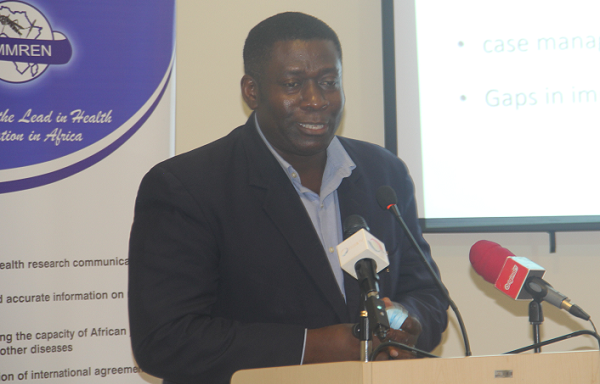
Elephantiasis is still endemic in Ghana – GHS
The Deputy Programme Manager in charge of Neglected Tropical Diseases (NTDs) under the Disease Control Department of the Public Health Division of the Ghana Health Service (GHS), Dr Joseph Kwadwo Larbi Opare, says lymphatic Filariasis commonly known as elephantiasis is still a major public health challenge in Ghana.
According to him, lymphatic Filariasis is endemic in 114 districts out of the 260 districts in the country with 11 districts serving as hotspot for the disease.
Advertisement
Similarly, he noted, the disease is endemic in 12 regions out of the 16 regions of the country.
Dr Joseph Kwadwo Larbi Opare made the disclosure in a presentation during the launch of the “March to Kigali” campaign in Accra on Thursday, April 7, 2022.
“March to Kigali”
The “March to Kigali” campaign seeks to promote an integrated approach to advocating for the elimination of NTDs and malaria in Africa.
The campaign was launched in April 2021, in the context of the build-up to the summit on NTDs and malaria on the eve of the Commonwealth Heads of Government Meeting (CHOGM) in Kigali, Rwanda, which provided a unique opportunity to further garner global attention and accelerate action to end these preventable and treatable diseases.
While this summit has been postponed due to COVID-19, the “March to Kigali” campaign builds on the existing partnerships and platforms of the “No to NTDs” and “Zero Malaria Starts with Me” campaigns and aims to secure commitments from regional, national and sub-national stakeholders to end these epidemics by 2030, as part of the Sustainable Development Goals (SDGs).
The campaign is being led by a group of like-minded Civil Society Organisation (CSOs) in Francophone and Anglophone African nations.
Speak Up Africa, a not-for-profit advocacy and policy action tank based in Dakar, Senegal, is one of the international CSOs leading the campaign with partnership from the African Media and Malaria Research Network (AMMREN), a network of African journalists and scientists working together to reduce the burden of malaria in Africa.
NTDs
Dr Kwadwo Larbi Opare said 103 districts out of the 114 endemic districts have interrupted transmissions, explaining further that onchocerciasis is also endemic in 137 districts in the country.
Efforts
He noted that out of the 20 neglected tropical diseases, five of them, including lymphatic Filariasis are still endemic in Ghana.
The other four, he mentioned, were onchocerciasis, schistomiasis, soil transmitted helminths, and trachoma.
He, however, said trachoma was eliminated in Ghana in 2018 and pointed out that the overall prevalence of schistosomiasis has decreased by one-third since 2000.
He also said there had been significant reductions in the parasitological parameters for both lymphatic Filariasis and onchocerciasis due to efforts being made by the Disease Control Department of the Public Health Division of the Ghana Health Service.
NTDs, Malaria treatable
The Executive Secretary of the African Media and Malaria Research Network, Dr Charity Binka, said while NTDs and malaria are entirely preventable and treatable diseases, they continue to be a major obstacle to economic and social development in Africa, affecting the most marginalised populations.
For her, the “March to Kigali” campaign is intended to advocate for increased government financial allocation to NTDs and malaria control from 2022 to 2023; advocate for increased private sector contribution to at least 10 per cent of the national gap for NTDs and malaria financing from 2022 to 2023 towards NTD and malaria control and elimination.
Dr Binka noted that the campaign will help to sustain public knowledge and practice in malaria prevention at all levels, stressing that since 2000, malaria deaths have fallen by 50 per cent, but progress has slowed in recent years.
For her, both malaria and NTDs are responsible for thousands of preventable deaths each year, and that NTDs affect more than 1.5 billion people worldwide whilst there are still more than 200 million malaria cases per year.
Sustained efforts
Launching the “March to Kigali” campaign, Dr Dr Keziah Malm, the Programme Manager of the National Malaria Control Programme (NMCP), said more concerted efforts are needed to fight malaria and NTDs in Ghana.
She said the country was also on course to eliminate the malaria, hopefully by 2030, adding that through the government’s interventions, the country would be successful in its eradication efforts.
Dr Malm has, therefore, called for more mobilisation efforts to fill in funding gaps, noting that “malaria is still endemic in the country.”
“If we have the right resources despite the challenges we are facing now, we will be able to reduce the disease,” she noted.




